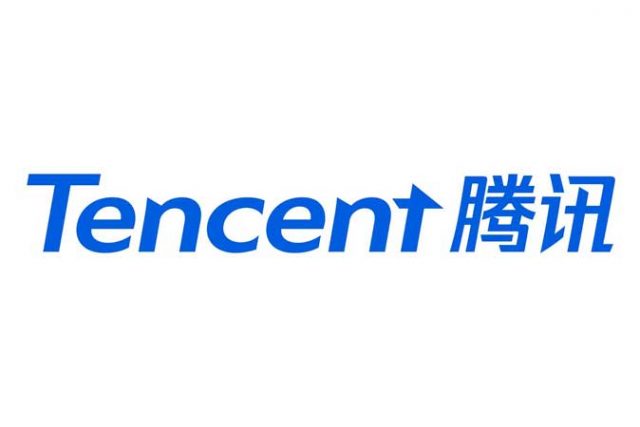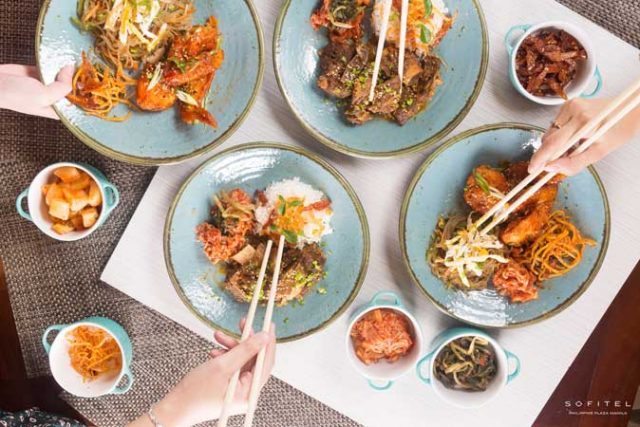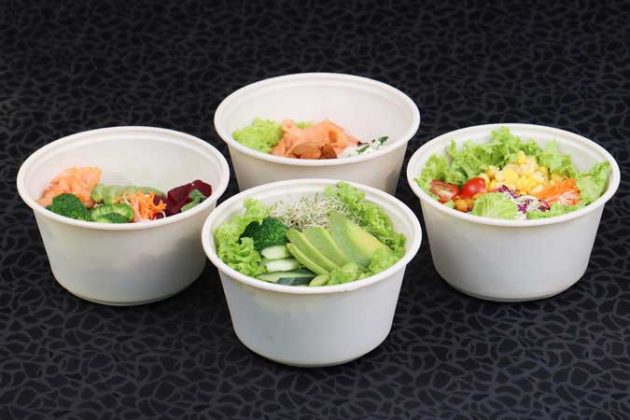Experience Spiral at home
SPIRAL buffet restaurant presents Spiral at Home, a specially chosen menu of signature dishes from across its 21 dining ateliers. Sofitel Philippine Plaza Manila’s flagship restaurant offers diners to a variety of regional favorites from around the world, taking them to a culinary journey from the comforts of home. The Spiral at Home specialties include a wide variety of options such as DIY Kits, Ready-to-Eat dishes, Cakes and Pastries, a Premium Feast selection, Deli, and Corporate Lunch Boxes. Leading the line-up is the DIY Kit Menu, comprised of Spiral’s most popular dishes such as Laksa, Indian Thali, Designer Cronuts, Spiral Burger Royale with foie gras, and more. Spiral’s pièce de résistance, the L’Epicerie, more popularly known as the Cheese Room, is now a click away and diners curate their own grazing platter with a wide variety of artisan cheeses, cold cuts, and signature homemade breads. Butchery items such as prime rib, rib eye, and Hungarian sausages are also available, as well as pantry items such as truffle oil and jams. Ready-to-Eat Dishes include rice bowls and noodle bowls of Thai, Japanese, Korean, Indonesian, and Vietnamese cuisines. Menu highlights include Pad Krapow Moo, Chicken Katsudon, Hiyashi Chuka Ramen, and Pad Thai to name a few. For the health buff, salad bowls such as Keto Bowl, Superfood Bowl, and Buddha Bowl are likewise available. Cakes and pastries from Spiral’s La Patisserie present creations such as Praline Salted Caramel Cake, Banana Nutella, Strawberry and Vanilla Shortcake, Chocolate Decadent Cake, and Kapeng Barako Mud Pie prepared by its pastry artisans. Spiral at Home’s Premium Feast Menu include the Japanese Sushi Platter, Omakase Set, and Churrasco Box just to name a few, good for four to six persons. Spiral’s Corporate Lunch Boxes featuring international set menus for remote or hybrid events. Japanese, Asian, and Western sets are available for lunch and dinner, as well as a line-up of Japanese Wanpaku Sandwiches for heavy snacks. Last but not the least, a wide range of select Old World and New World wines are not to be missed, straight from Spiral’s famed wine cellar. Varieties of champagne, red, white, and sweet wines from France, Italy, Germany, Chile, South Africa, and Argentina represent Sofitel’s signature flair for fine wines. Spiral at Home is available for pick-up and delivery at www.spiralathome.com. DIY Kits, Cakes and Pastries, and Premium Feast menus are available for pre-order 72 hours prior to scheduled pick-up. Ready-to-Eat, Corporate Lunch Box, and Deli items are available following Spiral restaurant’s operating hours. For inquiries, contact Spiral Reservations at H6308-FB12@sofitel.com or 8-832-6988. Follow Spiral Manila’s Facebook and Instagram pages for more updates and fresh promotions.
Tim Hortons now has new app
TIM HORTONS Philippines officially introduced its new app, on Aug. 3, to provide guests with rewards, perks, and special offers that can only be redeemed through the app for pick-up transactions. Coming soon will be a delivery option, as well. Through the new Tim Hortons Philippines app, favorites such as the best-selling Tim Hortons iced coffee, Farmers Breakfast wrap, Artisan Grilled cheese, and many more can be ordered in a single mobile platform. In addition to the exclusive offers, the app also allows guests to schedule pick-up orders, share customer feedback, earn and redeem rewards points, enjoy monthly exclusive promos, learn about the brand and its locations, and much more. Customers need to download the Tim Hortons Philippines app on their iOS or Android device and register an account. Once registered, app-exclusive rewards will appear in the “Loyalty” section and guests can select the reward that they want to redeem and tap “use in mobile” to activate and proceed with their pick-up order. To stay updated with the latest Tim Hortons news and information for takeout and delivery options, follow Tim Hortons Philippines on Facebook at www.facebook.com/TimhortonsPhilippines, Instagram @timhortonsphl, Twitter @timhortonsph or visit the website www.timhortons.ph.
Nespresso offers deals for coffee at home
RUNNING until Aug. 31, take advantage of Nespresso’s biggest limited-time offer to upgrade your pantry and stock up on coffee to carry you through the next months. Coffee drinkers can get their hands on Nespresso machines at 20% off when they purchase stand-alone units (except Creatista) with three coffee sleeves. Choose from Essenza Mini, Essenza Plus, Inissia, Pixie, or Citiz for compact machines that easily integrate with work spaces, home offices, common areas, and more. For those who prefer machines with built-in milk frothers for their daily lattes, flat whites, and creamy cappuccinos, customers can also opt for the innovative model that allow coffee drinkers to test their skill and creativity when they craft traditional or new recipes: the new Nespresso Atelier. It comes with a technology that allows the user to froth any type of milk and plant-based alternatives, such as almond or soy drink, all directly into a cup. The Nespresso Atelier has a slim, modern shape and brushed stainless-steel finishes. Meanwhilke, for every purchase of 15 coffee sleeves, patrons can avail 30% off on the Aeroccino 3 — a separate milk frother device that makes hot or cold creamy milk recipes possible like lattes or cappuccinos. Choose from its all-time favorites which offer a variety of mild to intense blends: Master Origin, World Explorations, Ispirazione Italiana, or Barista Creations. Meanwhile, from Aug. 7 to 9, the 8.8 online exclusive promo will gift customers a free View espresso cup for every coffee machine purchase transacted online. The promo culminates at the Ultimate Weekend exclusive from Aug. 27 to 31, which lets HSBC, BPI, and BDO cardholders avail of up to six months installment at 0% interest when they buy Nespresso machines either online or in-store. For more information on Nespresso products and offers, visit www.nespresso.ph, or follow @nespresso.ph on Instagram and or @nespresso.phl on Facebook. Nespresso retail stores are located in Power Plant Mall and The Podium, while pop-up stores are located in Greenbelt 5, One BHS, SM Mall of Asia, SM Aura, Alabang Town Center, Shangri-La Mall, Robinson’s Magnolia, and Trinoma.
FamilyMart launches Coffee Creations Caramel Macchiato
FAMILYMART is introducing a new addition to its Coffee Creations line with the Caramel Macchiato, which is now available across stores nationwide. Made with coffee, milk, vanilla syrup, and drizzled with caramel sauce, the new drink is served over ice, retailing for P105 for every 16 oz cup. It can be ordered over-the-counter across FamilyMart stores in the country, including those recently opened in Cebu and Baguio. The Caramel Macchiato is the latest drink to be added to FamilyMart’s coffee line called Coffee Creations. Launched in 2019, it has since introduced different drinks, including the Matcha Series, the Chocolate Series, and the Japanese cherry blossoms-inspired Sakura Series. Aside from specialty drinks, FamilyMart has also expanded its menu of ready-to-eat and “ready-to-heat” items including recently introduced items such as takoyaki and new onigiri variants.
The winner of the Japan-Philippines 65th Anniversary Online Cooking Contest
FOOD and Friendship: The Japan-Philippines 65th Anniversary Online Cooking Contest has found its winner in the dish “Shirashi in Tempura Taco Nori” by Ana Liezl Quibrantar. The online competition featured photo and video submissions from Filipino contestants that focus on Japanese cuisine and/or Filipino-Japanese fusion cooking. The entries were judged on criteria such as presentation, recipe, and photo (first round) or video (second round) quality. “Shirashi in Tempura Taco Nori” is derived from the classic Japanese dish shirashi. This version is prepared with marinated fish (similar to the Filipino kinilaw), mango, avocado, cucumber, and spring onion. It is served in a deep-fried nori shell with sushi rice topped with mayo and wasabi tobiko. The winning entry was determined by chef Suzuki Daisuke, who was awarded with the 2019 Foreign Minister’s Commendation for Excellent Executive Chef. Mr. Suzuki commended the finalists’ creativity in combining elements of Japanese and Filipino cuisine and their interpretation of classic recipes. He also noted the winning dish stood out because of its unique preparation technique and artful presentation. The contest is part of the year-long celebration of the 65th Anniversary of the normalization of bilateral ties between Japan and the Philippines. For the complete list of finalists and entry descriptions, visit: https://www.ph.emb-japan.go.jp/itpr_en/11_000001_00500.html. To see other events and activities connected to the 65 Years of Japan and the Philippines, visit: https://www.ph.emb-japan.go.jp/itpr_en/11_000001_00426.html























